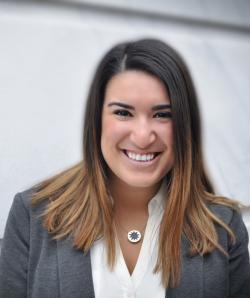April is Sexual Assault Awareness Month, an annual campaign to raise public awareness about sexual assault and educate people on how to prevent sexual violence. To learn more about sexual assault advocacy at Case Western Reserve University, The Daily sat down with Marina Giannirakis, student advocate for gender-based violence in Flora Stone Mather Center for Women.

Giannirakis has more than four years of experience working with survivors of sexual assault and domestic violence. In her role, she is responsible for providing confidential advocacy to all undergraduate, graduate and professional students affected by sexual and gender-based violence. Additionally, she facilitates advocacy awareness programming and supports the educational programming of the Mather Center.
Read on to learn more about advocacy and Giannirakis’ role at Case Western Reserve.
1. The CWRU advocate is here to help.
There are an overwhelming number of resources and options when disclosing sexual harassment. The process can feel stressful and confusing, so the advocate works to make sure no students are re-traumatized because of the systems involved. The advocate’s role is to provide explanations of various systems that may be involved when a student experiences sexual harassment.
For instance, a student may want to meet with a sexual assault nurse examiner (SANE) after a sexual assault. The CWRU advocate can walk the student through the process of meeting with the nurse and what kind of questions the nurse may ask. The advocate can also work with the student to see if they would like a Cleveland Rape Crisis Center (CRCC) advocate to meet them at the hospital (a service CRCC provides) and be present for their appointment with the SANE. Additionally, if the student wishes to pursue criminal action, the advocate can act as the liaison between the student and law enforcement. The advocate can attend meetings with the student and law enforcement and is there to support them throughout the entire process.
2. Services are confidential and free.
All advocacy services at Case Western Reserve are confidential and free of cost. The student advocate is a confidential resource that is available to support all students while keeping the students’ privacy. Because the student advocate is not a mandated reporter, students can work with the advocate to discuss sexual harassment situations, including sexual violence, and go over options without having to make a formal report to Title IX or law enforcement.
3. The CWRU advocate provides immediate assistance, not long-term counseling.
Advocacy at CWRU is focused on immediate assistance and crisis management. The student advocate is not a counselor or therapist, though working with both can be helpful and valuable during a traumatic experience. Although the advocate’s primary role is to support students, their role differs from a counselor in that their focus is the present situation and addressing the crisis immediately and the systems involved. A counselor or therapist, while also working to support a student in the present, may also explore past trauma, underlying trauma and future growth and healing. The advocate will focus on creating an action plan with students on what options are possible, what resources are available, and what systems they can help navigate.
4. There is no time limit on advocacy.
It does not matter the situation, or when the situation happened—the student advocate is available and a trauma-informed resource for students.
For example, a student may reach out to the advocate as a first-year student about an incident that happened their first week of school. The advocate and student meet, go over options, and the student chooses not to move forward and report. The advocate does not hear from the student again for another year. Now, the student seeks out the advocate for additional support because they are ready to report and want to make sure what happened to them does not happen to anyone else. The advocate stands by the survivor as they choose what is next for them on their recovery journey.
5. Advocates believe you.
The advocate is not a detective, nor an investigator. They are on campus to support and believe survivors. The advocate is trained in trauma-informed care and works with students to eliminate re-traumatization while students heal and recover. One of the advocate’s primary responsibilities is to validate survivor’s experiences and support them regardless of if they want to report the harassment or not. Survivors, we believe you.
If you are a student who has experienced power-based personal violence, including sexual assault, staking or any form of harassment, please know that the advocate is here to listen.
Faculty and staff, if a student comes to you seeking assistance or advice, please let the student know there is a confidential advocate on campus available to help and go over options. Remind the student that most likely you are a responsible employee and/or mandated reporter and if a student discloses sexual harassment to you, you have a duty to report.
After-Hours and 24/7 Resources:
Campus
- CWRU Confidential SAFEline: 216.368.7777
- University Health and Counseling Services’ Counselor On-Call (all hours): 216.368.5872
Community
- Cleveland Rape Crisis Center Hotline (call or text): 216.619.6192
- Journey Center for Safety and Healing Helpline (call or text): 216.391.4357
Additionally, there are resources available for faculty and staff who have been affected by sexual harassment and/or power-based personal violence.
Campus
- Office of Equity: 216.368.3066
- IMPACT Solutions: 1.800.227.6007
Community
- Cleveland Rape Crisis Center Hotline (call or text): 216.619.6192
- Journey Center for Safety and Healing Helpline (call or text): 216.391.4357

